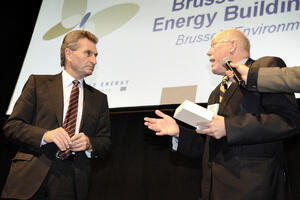The sixth edition of the Sustainable Energy Europe Awards attracted 262 entries to win in one of five categories covering Communicating, Consuming, Learning, Living and Travelling. The 2012 winners are:
Communicating: EnergizAIR, Belgium - A consortium coordinated by the Association
for the Promotion of Renewable Energies (APERe) is helping to build consumer
understanding of, and confidence in, energy consumption and renewables with a groundbreaking
idea. Using the weather forecast, an effective communication channel for
reaching a wide and diverse audience, it links energy topics to everyday weather
conditions. Some 14 media outlets in five countries have changed the format of their
daily weather report, incorporating daily pictogrammes for three RE indicators - solar
thermal, photovoltaic production and wind energy. These indicators highlight in an
accessible way the crucial link between weather, energy sources and consumption.
Consuming: Energy-savings check for households with low income, Germany
The Federal Association of Energy and Climate Saving Agencies (eaD) and the welfare
association Caritas created a unique project combining ecological, economic and social
aspects. Energy-savings advisers visit low-income households and audit energy and
water consumption levels and habits. The information is collated in a central database
and a report generated advising on low- or no-cost measures to save energy and money
– on average up to €100 per year. The project has conducted 75 000 consultations to
date, and trained 2 500 long-term unemployed as ‘Stromsparhelfern’ (energy advisers).
Learning: Enercities, Netherlands - Designed by a pan-EU consortium and led by ROC
Nijmegen, Enercities offers a game-based learning platform that acquaints young people
with the EU 2020 objectives. The web-based, 3D game engages and educates players
about energy issues and their implications by setting them the challenge of building a
virtual sustainable city. Balancing energy demands with economic, environmental and
consumer concerns, players must take into account important ‘real-life’ factors such as
pollution, energy shortages, energy reduction plans and renewable energy projects.
Promoted in schools, via regional events, competitions and on social media, nearly
100,000 individuals in 155 countries worldwide have stepped up to this virtual challenge.
Living: Brussels Nearly Zero Energy Building Policy, Belgium – In 2004, the
Brussels-Capital Region (RBC) began several large-scale experiments to gauge the
potential for wide-scale participation in reducing the environmental impact of the energy
performance of buildings. Based on the positive results, in 2007, RBC (coordinated by
IBG-BIM and Bruxelles-Environnement) launched the ‘Exemplary Buildings’ call for
projects, a major stimulation programme for the construction and renovation of very high
energy and environmental performance buildings. The programme has reversed the city’s
energy culture through a mix of policy and actions, achieving significant results without a
significant increase in costs. Thanks to the experiment, RBC has imposed standards on all
future public buildings (passive) and renovations (very low energy) under its authority.
Travelling: ‘Remember When?’ Campaign 2011 (Liftshare.com Ltd, UK)
The 2011 Liftshare Week ‘Remember When?’ campaign used an attention-grabbing,
humorous approach to encourage and enable as many individuals as possible to share
their journeys, by focusing on what petrol used to cost 20 years ago – and how it still can
if you car-share. A multimedia marketing campaign incorporating 245 actions had a
direct impact on behaviour, with a record 6 206 members – three per minute – joining
the car-sharing network over the course of the five-day campaign. Easily replicated, the
project does not just benefit the environment but also makes more efficient use of
existing infrastructure, reduces energy reliance, improves accessibility and addresses
social exclusion, thereby significantly contributing to four of the five EU 2020 objectives:
Employment, R&D/Innovation, Climate Change/Energy and Poverty/Social exclusion.
Managenergy is an initiative of the EU's Intelligent Energy - Europe (IEE)
programme. The sixth edition of the Managenergy Local Energy Action Award
attracted a record 64 submissions from local and regional sustainable energy
initiatives in 23 countries. The 2012 winner is:
SamsØ 2.0 – Energy Education, Denmark – In a country with a long tradition of
sustainable solutions supported by green policies, SamsØ was elected in 1997 to be
Denmark’s renewable energy island - a demonstration center for proven technology in
renewable energy solutions. The three main aims of the SamsØ Energy Academy,
established in 2007, demonstrate a fully-integrated approach: to achieve an entirely
fossil-free community, to increase the number of partnership satellite islands/cities and
to train and educate national and international participants, whether stakeholders,
schools or the general public. An excellent best-practice example, the project is currently
being replicated in other countries, from Ireland and Germany to South Korea and Japan.
Background:
The EU awards are a highlight of EU Sustainable Energy Week (EUSEW), during which
stakeholders and policymakers help generate new ideas and actions to support Europe in
reaching its energy goals. Taking place between 18 – 22 June, EUSEW 2012 includes a
high-level policy conference in Brussels, with an expected attendance of around 4 000
people, as well as more than 900 ‘Energy Days’ across Europe.
Pictures: eusew.eu

